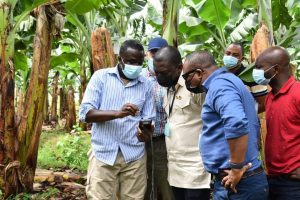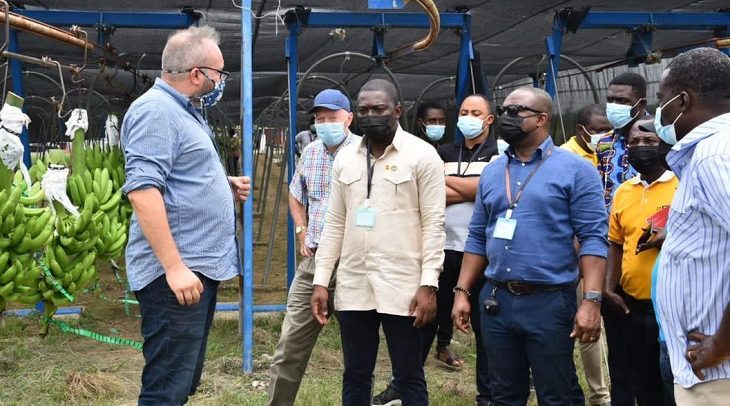Government is committed to providing incentives and a conducive environment to enhance operations of agribusinesses and expand the country’s export capacity.
Deputy Minister of Trade and Industry, Herbert Krapa, who gave the assurance, said government recognises the contributions of agribusinesses to the country’s export sector and the economy.
Speaking to the media after a tour of a banana farm and packaging facility owned by French company, Golden Exotics Limited (GEL), at Asutuare in the Shai Osudoku District of the Greater Accra Region, Mr Krapa said government was doing all it could to create the enabling environment to ensure that agribusinesses thrived.
The tour was to afford the Minister the opportunity to obtain a first-hand information on the operations of the company and understand their challenges to inform government’s policies.
He was accompanied by Deputy Chief Executive in charge of Operations and Finance, Ghana Export Promotion Authority (GEPA) Samuel Dentu, and other officials from the Ministry as well as GEPA.
The Deputy Minister commended GEL for its contribution to the economy of Ghana, particularly in the area of employment and knowledge sharing.
“I believe that the 3,000 Ghanaians that they have employed, how their employees go about their responsibilities and the work that they have to do from packing to harvesting, pruning, cutting off the disease leaves, I think beyond job creation that the knowledge transfer is an important part of it as well and I am satisfied,” Mr. Krapa explained.

To boost the country’s export capacity and earnings, he said government had in place a holistic plan such as the National Export Development Strategy enhance the productive capacity of agribusinesses.
He said Ghana as a signatory to various agreements, including the African Continental Free Trade Area (AfCFTA), the Ghana-UK Trade Partnership Agreement, the Ghana-AU Economic Partnership Agreement, the country hoped to attract more foreign direct investment into the country to help increase the number of exporters and boost the capacity of the existing ones to take advantage of these platforms.
“We have an ambitious plan to increase Non-Traditional Export (NTE) from $2.5 billion currently to $25 billion within a space of 10 years and they are the ones that we would be relying on to be able to achieve that. It has significant impact on the economy as we know, the forex, the economy, job creation, boosting the local economy as well and it is important that we assure and reassure them continuously that we are partners in this.
“We will be working together, we will continue to provide them the support,” he said.
Ghana in 2019 earned $2.899 billion from the export of non-traditional commodities, 3.10 percent higher than the $2.813 billion recorded in 2018, to the 2019 NTE statistics released by GEPA.
Vice-President of GEL Ghana, Oliver Chassang, said the company had invested about €40 million since it began operation in the country in 2003, adding that it was exploring the possibility of expanding in the future.
Currently, GEL has a total of 1,600 hectares of banana plantation, out of which 1,000 hectares are conventional bananas and the remaining 600, organic bananas.
Mr Chassang said the company this year hoped to export 80,000 tonnes of bananas, mostly to the European market, as well as ECOWAS countries including Mali, Burkina Faso and Niger.
Out of this, he said, 20,000 would be organic bananas and 60,000 tonnes conventional.
While commending the Deputy Trade Minister for paying a working visit to the company, he urged government to ensure continued stability and reliability to boost investor confidence to attract more investments.
GNA


